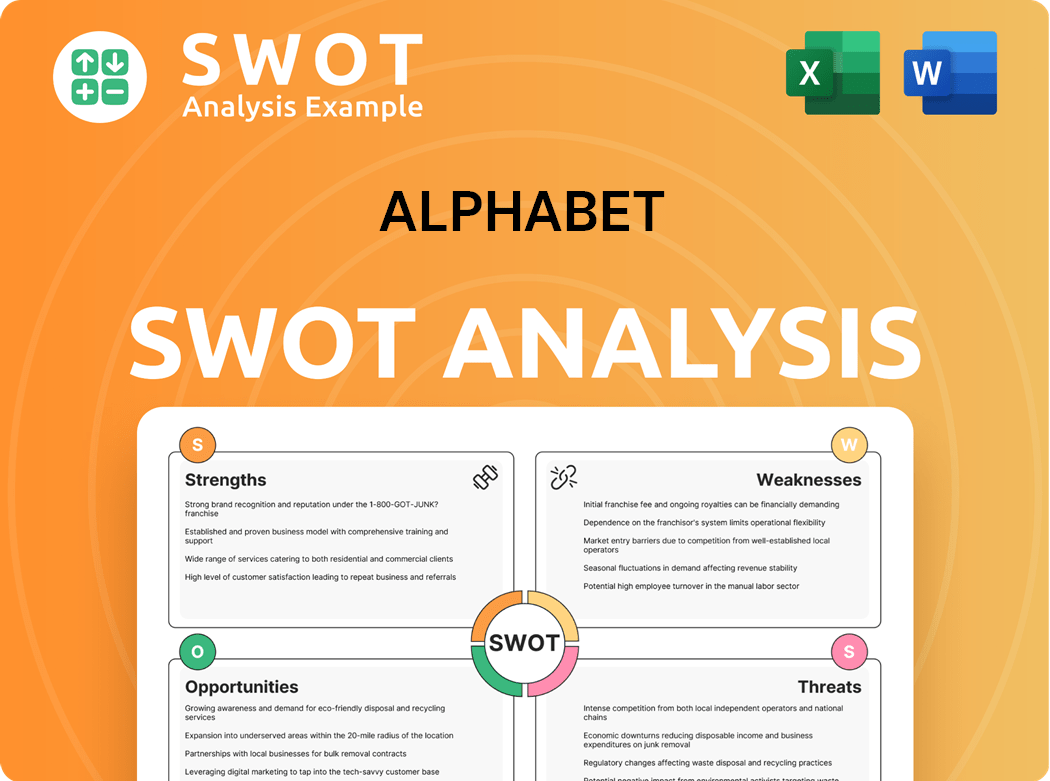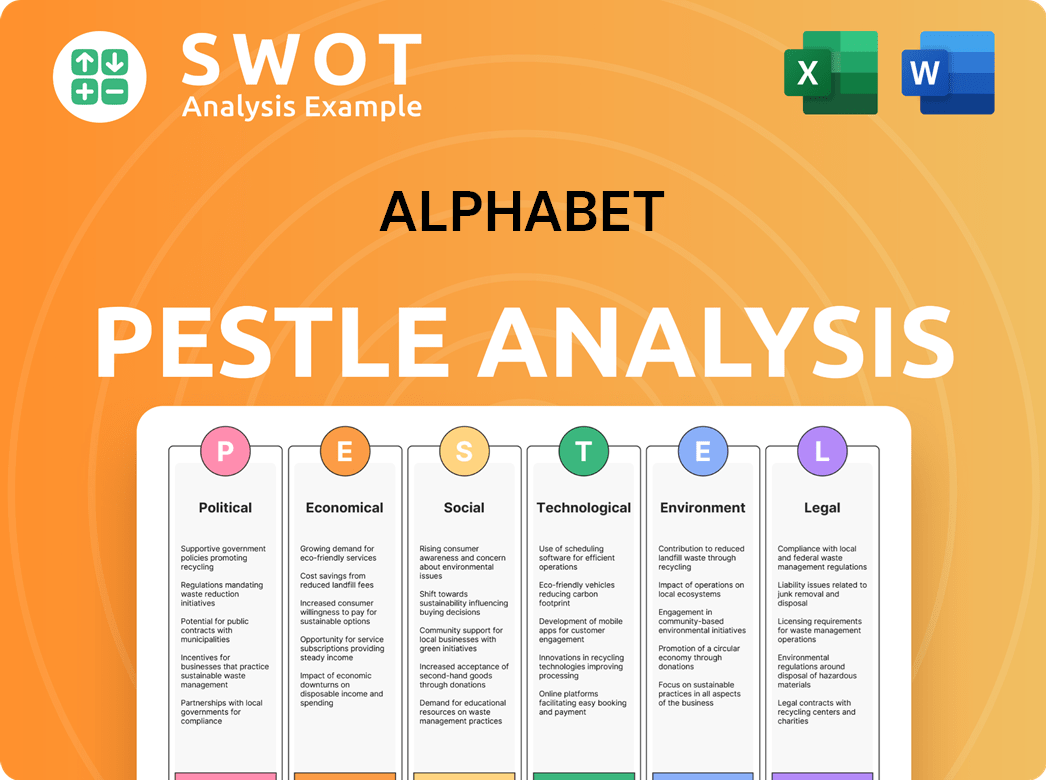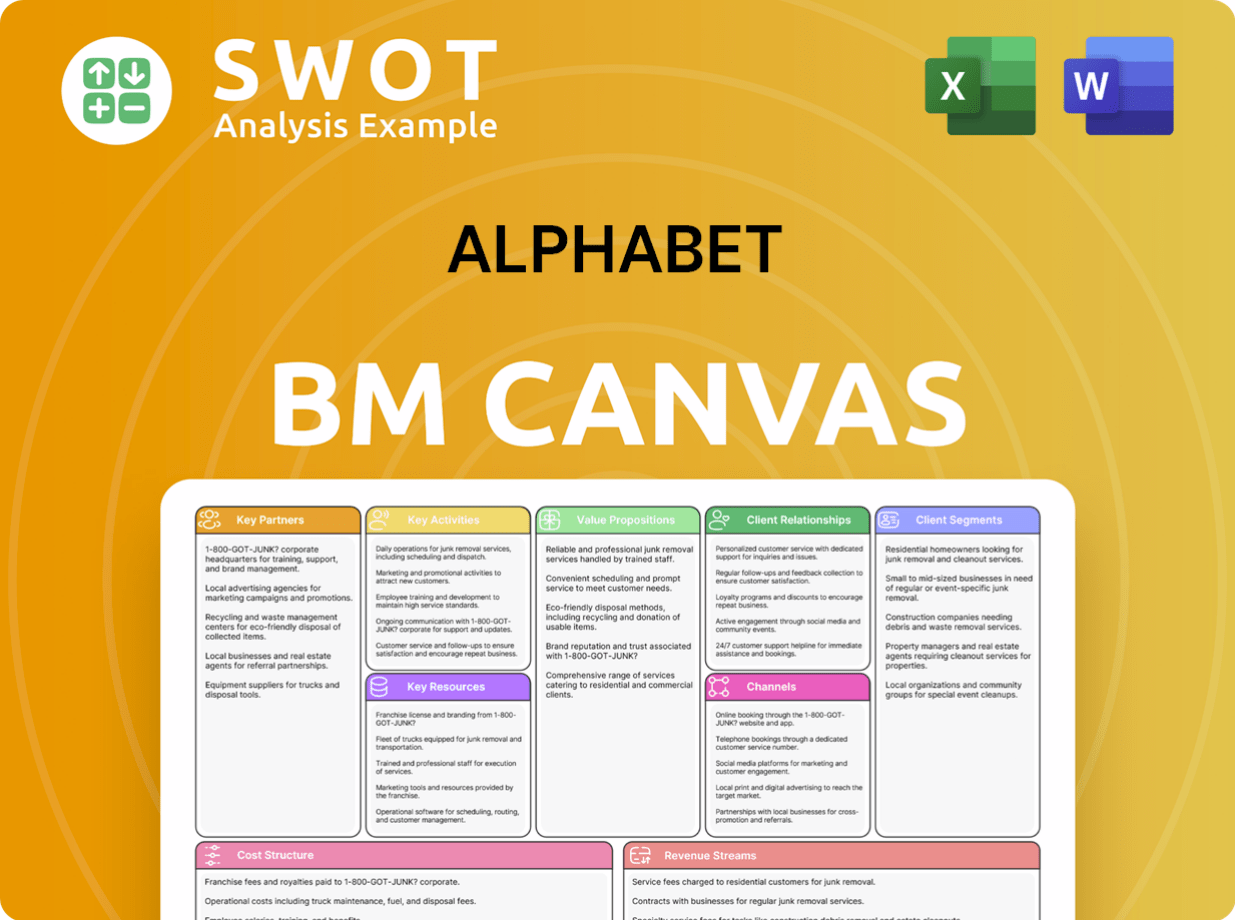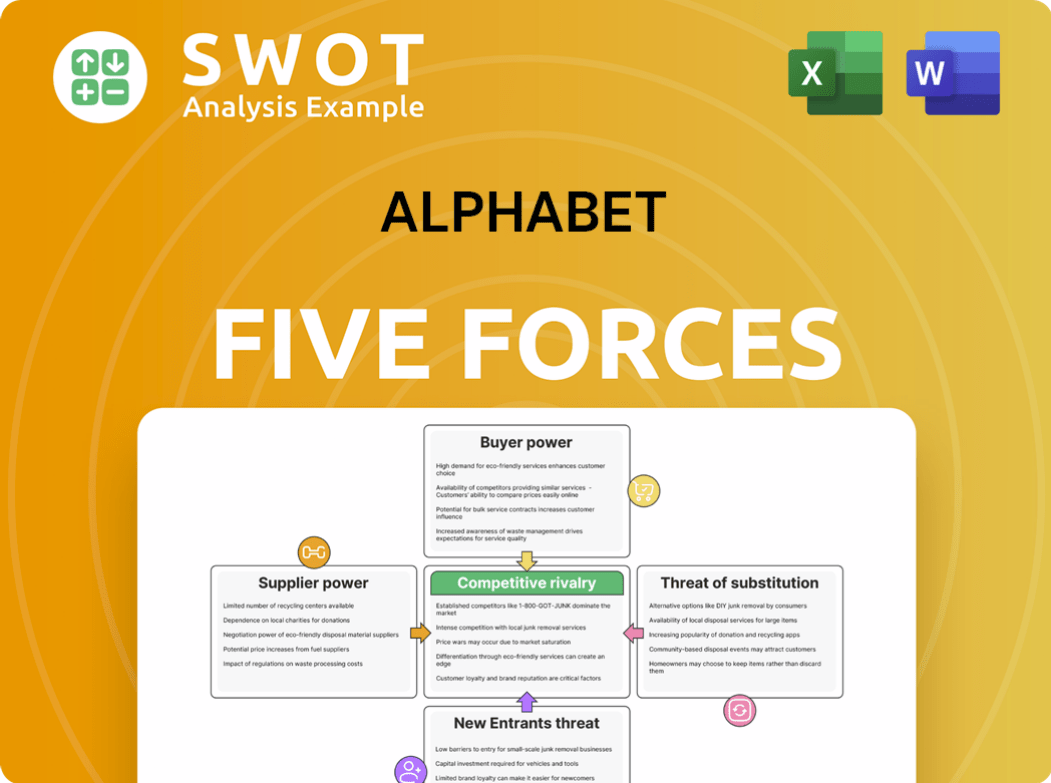Alphabet Bundle
Who are Alphabet's Main Rivals in the Tech Arena?
Alphabet Inc., the powerhouse behind Google, has become synonymous with the digital age, but who are the companies vying for its crown? From search to cloud computing, Alphabet's influence is vast, making its Alphabet SWOT Analysis a critical tool for understanding its position. This exploration dives deep into the dynamic and fiercely contested Alphabet competitive landscape.

Understanding the Alphabet competitive landscape is crucial for any investor or strategist. This analysis will dissect Alphabet's primary competitors, assess Google market share, and evaluate its competitive advantages and disadvantages. We'll also examine the tech industry analysis, including digital advertising competition, to offer a comprehensive view of Alphabet's position and future prospects, considering its challenges in the global market.
Where Does Alphabet’ Stand in the Current Market?
Alphabet maintains a strong market position across several key technology sectors. Its core operations revolve around web search, digital advertising, cloud computing, and various other technology-driven ventures. The company's value proposition lies in its ability to provide innovative products and services that cater to a global customer base, from individual consumers to large enterprises.
The company's diverse portfolio includes Google Search, Google Ads, Android, Chrome, Gmail, YouTube, and Google Cloud, all contributing to its extensive reach and market dominance. This broad range of offerings allows Alphabet to capture significant value across different segments of the tech industry, reinforcing its competitive advantage. For a deeper understanding of the company's origins, you can explore the Brief History of Alphabet.
Alphabet's financial performance underscores its market strength and operational efficiency. For the fiscal year ended December 31, 2024, Alphabet reported consolidated revenues of $350.018 billion, with a net income of $100.118 billion. In Q1 2025, consolidated revenues increased 12% year-over-year to $90.2 billion, reflecting robust momentum across its businesses.
Google Search remains the undisputed leader in web search, holding approximately 86.6% of the desktop market share and an even more dominant 95.03% in the mobile segment as of February 2021. This strong market share is particularly evident in regions like Europe, where Google commands over 97% of the mobile search market. This dominance is a key factor in the overall Alphabet competitive landscape.
Alphabet's financial health is robust, with consolidated revenues reaching $350.018 billion in 2024. The company's operating margin expanded to 34% in Q1 2025, showcasing strong operational efficiency. The advertising business continues to be a substantial cash generator, with Google Cloud and YouTube subscriptions increasingly contributing to free cash flow.
Google Cloud is a rapidly expanding segment, reporting a 28% increase in revenues to $12.3 billion in Q1 2025. This growth is driven by advancements in Google Cloud Platform (GCP), AI Infrastructure, and Generative AI Solutions. While it trails major competitors like Microsoft and Amazon in terms of annual revenue, it is steadily gaining ground.
Alphabet projects significant capital expenditures of approximately $75 billion in 2025. These investments are primarily focused on AI infrastructure and data centers, indicating the company's commitment to innovation and future growth. This strategic allocation supports its competitive strategy in cloud computing and other key areas.
Analyzing the Alphabet competitive landscape reveals several key dynamics. The company faces competition in various sectors, including search, advertising, cloud computing, and mobile operating systems. Google's market share in search remains dominant, but it competes with other tech giants in areas like cloud services and digital advertising competition.
- Search Dominance: Google's strong position in web search is a significant advantage.
- Cloud Competition: Google Cloud competes with Microsoft Azure and Amazon Web Services (AWS).
- Advertising: Alphabet faces competition in the online advertising space from various players.
- Mobile Ecosystem: Android's market share is a key factor in the mobile operating system market.
Alphabet SWOT Analysis
- Complete SWOT Breakdown
- Fully Customizable
- Editable in Excel & Word
- Professional Formatting
- Investor-Ready Format

Who Are the Main Competitors Challenging Alphabet?
The Alphabet competitive landscape is characterized by intense competition across its diverse business segments. The company faces significant challenges from both established tech giants and emerging players. Understanding Alphabet's competitors is crucial for analyzing its market position and future prospects.
Google market share and overall financial performance are directly impacted by the competitive dynamics in each of its key areas. The company's ability to innovate, adapt, and maintain its competitive edge is critical for its long-term success. This article provides a comprehensive overview of the primary competitors and the competitive environment.
Alphabet faces multifaceted competition, particularly from major tech companies. The digital advertising sector, a primary revenue stream, sees competition from platforms like Amazon, Meta, and others. In cloud computing, Google Cloud competes with Amazon Web Services (AWS) and Microsoft Azure. The mobile operating system market faces competition from Apple's iOS. The video streaming landscape includes competition from services like Amazon, Apple, Netflix, and TikTok. Finally, the AI field sees competition from Microsoft and other emerging AI models.
In digital advertising, Alphabet's primary competitor is Meta Platforms, which owns Facebook and Instagram. Amazon is another significant player, leveraging its e-commerce platform for advertising. Other competitors include AppNexus and Criteo, which focus on programmatic advertising and retargeting. The rise of social networks, such as TikTok, also poses a challenge.
The cloud computing market is dominated by Amazon Web Services (AWS) and Microsoft Azure. Google Cloud, although growing rapidly, has a smaller market share. In Q1 2024, AWS held approximately 32% of the cloud infrastructure market, while Azure held around 25%, and Google Cloud held about 11%. This segment is crucial for enterprise customers and AI infrastructure.
Android, Alphabet's mobile operating system, holds a dominant position in the global market. However, Apple's iOS remains a strong competitor, particularly in the premium smartphone segment. The competition is fierce, with each company vying for user loyalty and market share through software updates and hardware integration.
In consumer electronics, Alphabet's Pixel devices and Chromecast compete with offerings from Apple, Microsoft, Amazon, and Samsung. The competition focuses on product features, design, and ecosystem integration. The success of these products depends on their ability to differentiate themselves in a crowded market.
YouTube is the most popular video-on-demand streaming platform with over 2 billion users. However, it competes with services like Amazon, Apple, Netflix, and TikTok. YouTube Shorts, Google's short-form video platform, directly challenges TikTok's growth. The competition involves content creation, user experience, and monetization strategies.
In the rapidly evolving field of AI, Alphabet faces competition from Microsoft, which has invested heavily in OpenAI and its ChatGPT. New AI models launched by companies like DeepSeek also present a challenge through low-cost offerings. The AI landscape is dynamic, with constant advancements and new entrants.
The competitive landscape is shaped by several factors, including technological advancements, regulatory scrutiny, and market trends. Alphabet's ability to navigate these challenges will determine its future success. For more insights into the company's strategic positioning, consider reading about the Target Market of Alphabet.
- Amazon.com, Inc.: Competes in digital advertising, cloud computing (AWS), e-commerce, and consumer electronics.
- Apple Inc.: Competes in mobile operating systems (iOS), consumer electronics, and video streaming.
- Meta Platforms: Competes in digital advertising and social networking.
- Microsoft Corporation: Competes in cloud computing (Azure), AI, and productivity software.
- TikTok: Competes in short-form video and advertising.
Alphabet PESTLE Analysis
- Covers All 6 PESTLE Categories
- No Research Needed – Save Hours of Work
- Built by Experts, Trusted by Consultants
- Instant Download, Ready to Use
- 100% Editable, Fully Customizable

What Gives Alphabet a Competitive Edge Over Its Rivals?
The competitive landscape for Alphabet is shaped by its robust advantages, including a dominant position in web search, advanced AI capabilities, and a strong brand. Its strategic moves, such as investments in emerging technologies and AI, are designed to maintain its market dominance. Analyzing the Alphabet competitive landscape reveals a company that leverages its ecosystem and technological prowess to compete in a dynamic tech industry.
Key to Alphabet's success is its ability to innovate and adapt. The company's 'full stack approach to AI' and its continuous product development, like the Veo 2 AI video generator, are examples of its commitment to staying ahead. This competitive edge is further solidified by its diversified growth engines, such as Android and YouTube, which create a synergistic ecosystem. Understanding Alphabet competitors is crucial for grasping the company's position in the market.
Alphabet's competitive advantages are multifaceted, stemming from its deep-rooted ecosystem, proprietary technologies, and strong brand equity. A primary advantage is its dominance in web search, driven by sophisticated algorithms and a massive data infrastructure. This core strength underpins its highly profitable digital advertising business, Google Ads. The company's ability to deliver lightning-fast and highly relevant search results contributes significantly to its market share.
Alphabet, through Google, maintains a significant lead in the search engine market. Its sophisticated algorithms and vast data infrastructure enable it to provide highly relevant search results. This dominance fuels its digital advertising business, Google Ads, which is a major revenue generator.
Alphabet's 'full stack approach to AI' is a key differentiator. Investments in machine learning have led to smarter products across Search, Workspace, Cloud, and YouTube. The rollout of Gemini 2.5 and its AI-powered Google Cloud portfolio, with 70% of generative AI startups as clients as of December 2024, showcase its strength in AI infrastructure.
The Google brand is globally recognized and deeply integrated into daily digital interactions. Its diversified growth engines, including Android, YouTube, and Chrome, create a synergistic ecosystem that amplifies reach and user engagement. Android's dominance in the mobile OS market provides a vast platform for Google's services.
Alphabet's massive infrastructure investments enable robust cloud services and cutting-edge AI capabilities at a scale that smaller competitors struggle to match. This scale contributes to strong operational efficiency, as evidenced by declining total costs and expenses as a percentage of revenue. This is a key factor in Google market share.
Alphabet's strategic investments in emerging technologies and its 'Other Bets' segment position it for long-term value creation. Continuous innovation, such as breakthroughs in quantum computing and the Veo 2 AI video generator, further solidify its competitive edge. These advantages are leveraged through aggressive product development and strategic partnerships. However, the sustainability of these advantages faces threats from imitation and ongoing industry shifts, particularly in the rapidly evolving AI landscape and due to increasing regulatory scrutiny. For a deeper dive, consider reading this article about Alphabet's competitive advantages.
Alphabet's competitive strengths are multifaceted, including its dominance in web search, advanced AI capabilities, and a strong brand. These advantages are leveraged through aggressive product development and strategic partnerships, though the sustainability of these advantages faces threats from imitation and ongoing industry shifts, particularly in the rapidly evolving AI landscape and due to increasing regulatory scrutiny.
- Dominance in Web Search: Powered by sophisticated algorithms and vast data infrastructure, delivering highly relevant search results.
- AI Innovation: 'Full stack approach to AI' with investments in machine learning, enhancing products across Search, Workspace, Cloud, and YouTube.
- Brand Equity and Ecosystem: The Google brand is globally recognized and deeply integrated into daily digital interactions.
- Economies of Scale: Massive infrastructure investments enabling robust cloud services and cutting-edge AI capabilities at a scale that smaller competitors struggle to match.
Alphabet Business Model Canvas
- Complete 9-Block Business Model Canvas
- Effortlessly Communicate Your Business Strategy
- Investor-Ready BMC Format
- 100% Editable and Customizable
- Clear and Structured Layout

What Industry Trends Are Reshaping Alphabet’s Competitive Landscape?
The technology industry is currently undergoing significant shifts, with Artificial Intelligence (AI) at the forefront. This creates both opportunities and challenges for companies like Alphabet. As the competitive landscape evolves, understanding Alphabet's position, the associated risks, and the future outlook is crucial for investors and industry analysts. The following analysis provides a detailed overview of these aspects.
Alphabet's competitive landscape is influenced by its diverse portfolio, including search, advertising, cloud computing, and AI-driven services. The company faces intense competition from tech giants like Microsoft and Amazon. Regulatory scrutiny and the need for continuous innovation in AI are key factors shaping its future. Despite these challenges, opportunities in digital advertising and cloud services exist, making it essential to evaluate Alphabet's strategies and market dynamics.
The tech industry is driven by the rapid advancement of AI, impacting all sectors. Alphabet is deeply invested in AI, integrating it across its services. The demand for AI-driven tools is increasing, positioning Alphabet to benefit. The growth of digital and mobile video consumption also benefits YouTube.
Alphabet faces stiff competition in the AI space from Microsoft and OpenAI. Substantial investments in AI development are necessary, with an estimated $50 billion spent in 2024. Regulatory scrutiny and antitrust concerns pose ongoing challenges. Traditional search monetization is threatened by AI services.
Digital advertising continues to drive revenue growth for Google Ads and YouTube. Google Cloud's growth offers diversification and direct competition with cloud leaders. Emerging markets and product innovations like Waymo and Verily present long-term value. The global economic outlook for 2025 offers some hope.
Alphabet is prioritizing AI innovation, cost control, and revenue diversification to adapt. The company aims to move faster and focus on AI to solve user problems. CEO Sundar Pichai emphasizes the urgency to leverage AI. The company's strategies aim to adapt to changing consumer behaviors and technological advancements.
Alphabet's competitive advantages include its strong market position in search and digital advertising, its vast data assets, and its investments in AI and cloud computing. The company benefits from a diversified revenue stream and a strong brand reputation. However, Alphabet faces disadvantages such as intense competition from Microsoft and Amazon, regulatory scrutiny, and the high costs of AI development. The company's dependence on advertising revenue and the potential disruption from AI-driven search also pose challenges.
- Market Share: Google maintains a significant market share in the search engine market.
- Financial Performance: In 2024, Alphabet invested heavily in AI, with capital expenditures expected to reach approximately $75 billion in 2025.
- Regulatory Challenges: Antitrust investigations and lawsuits continue to impact Alphabet's operations, particularly in the U.S. and Europe.
- AI Investments: The company's substantial investments in AI are critical for future growth and competitiveness.
Alphabet Porter's Five Forces Analysis
- Covers All 5 Competitive Forces in Detail
- Structured for Consultants, Students, and Founders
- 100% Editable in Microsoft Word & Excel
- Instant Digital Download – Use Immediately
- Compatible with Mac & PC – Fully Unlocked

Related Blogs
- What are Mission Vision & Core Values of Alphabet Company?
- What is Growth Strategy and Future Prospects of Alphabet Company?
- How Does Alphabet Company Work?
- What is Sales and Marketing Strategy of Alphabet Company?
- What is Brief History of Alphabet Company?
- Who Owns Alphabet Company?
- What is Customer Demographics and Target Market of Alphabet Company?
Disclaimer
All information, articles, and product details provided on this website are for general informational and educational purposes only. We do not claim any ownership over, nor do we intend to infringe upon, any trademarks, copyrights, logos, brand names, or other intellectual property mentioned or depicted on this site. Such intellectual property remains the property of its respective owners, and any references here are made solely for identification or informational purposes, without implying any affiliation, endorsement, or partnership.
We make no representations or warranties, express or implied, regarding the accuracy, completeness, or suitability of any content or products presented. Nothing on this website should be construed as legal, tax, investment, financial, medical, or other professional advice. In addition, no part of this site—including articles or product references—constitutes a solicitation, recommendation, endorsement, advertisement, or offer to buy or sell any securities, franchises, or other financial instruments, particularly in jurisdictions where such activity would be unlawful.
All content is of a general nature and may not address the specific circumstances of any individual or entity. It is not a substitute for professional advice or services. Any actions you take based on the information provided here are strictly at your own risk. You accept full responsibility for any decisions or outcomes arising from your use of this website and agree to release us from any liability in connection with your use of, or reliance upon, the content or products found herein.